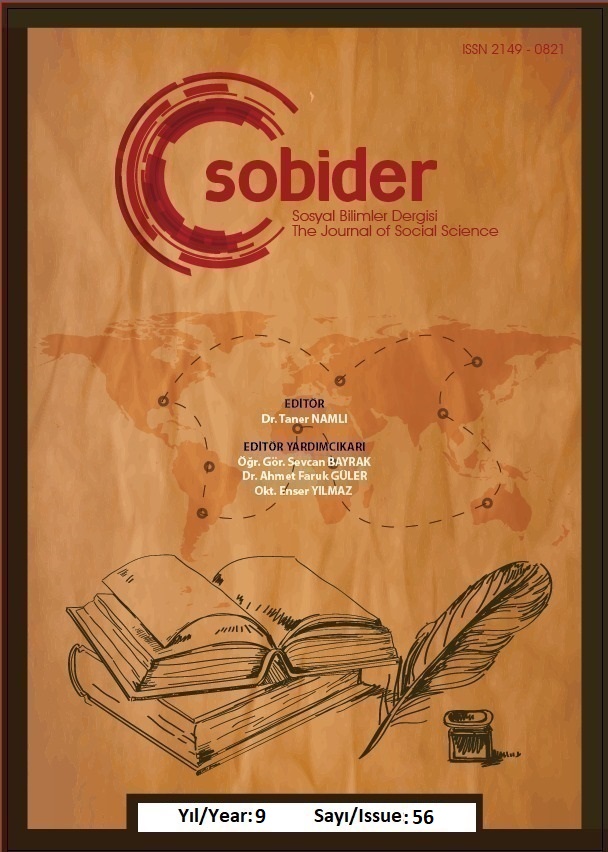Author :
Abstract
Çok inançlı ve çok kültürlü Türkiye coğrafyasında birbirleriyle organik ilişkiler içinde bulunan İslâm topluluklarının güncel gözlemlere dayanarak tanıtılması önem arz etmektedir. Siyasetin önünü açmak için bu toplulukların evrensel değişme ve gelişmeleri yakalayacak anlayışlarını öğrenmek bir zorunluluktur. Toplumsal etkileşim ve değişimin hızlı olduğu bu modern çağda onların din anlayışlarını kamuoyu ile anlaşılır bir biçimde paylaşmayı tarih bizden istemektedir. Araştırmamızın konusu sözlü geleneğe göre Sivas Alevî-Bektaşî toplumunun İslâm anlayışı ve pratiğidir. Onların inanç ve ibadet pratiklerinin ortaya konması Türk toplumsal ve siyasal yaşamı açısından son derece önemlidir. Sivas Alevî-Bektaşîler’in akide ve uygulamalarının doğru anlaşılması din-siyaset ilişkilerine olumlu katkı sağlayacağını düşünüyoruz. Araştırmada doğru olacağını düşündüğümüz iki yöntem izledik. İlk olarak Alevî-Bektaşî kanaat önderleriyle derinlemesine mülakat yaptık. İkinci aşamada saha araştırması yaptık. Onların geleneksel yapılanmalarının birçok özel kavramlarla ifade edildiğini gördük. Görsel bir bakışla yaptığımız çalışmamızda bu kavramları irdelemeye yönelik çözüm analizlerine girmedik. Mümkün mertebe sahada gördüklerimizi ve mülakat yöntemiyle elde ettiğimiz bilgileri yazdık. Sivas Alevî-Bektaşîler’in din anlayışlarını akademik bir disiplin ve teorik bir derinlikle anlatmayı amaçladık.
Keywords
Abstract
It is important to introduce the Islamic communities, which have organic relations with each other in the multi-faith and multi-cultural geography of Turkey, based on current observations. In order to pave the way for politics, it is imperative to learn the understandings of these communities that will capture universal changes and developments. In this modern age where social interaction and change are rapid, history demands from us to share their understanding of religion with the public in an understandable way. The subject of our research is the understanding and practice of Islam of the Sivas Alawi-Baktashi society according to the oral tradition. It is extremely important for Turkish social and political life to reveal their belief and worship practices. We think that a correct understanding of the creed and practices of Sivas Alawi-Baktashis will contribute positively to religion-politics relations. We followed two methods that we thought would be correct in the research. First, we conducted in-depth interviews with Alawi-Baktashi opinion leaders. In the second stage, we conducted field research. We have seen that their tranditional structuring is expressed in may special concepts. In our study, which we conducted with a visual perspective, we did not enter into solution analyzes to examine these concepts. We wrote down what we saw in the field as much as possible and the information we obtained through the interview method. We aimed to explain the religious understanding of Sivas Alawi-Baktashis with an academic discipline and theoretical depth.
Keywords
- Altı, Aziz. “Yedi İklim Çar Köşenin Serçeşmesi: “Hacı Bektaş Veli Tekkesi”. Uluslararası Hacı Bektaş Velî ve Takipçileri Sempozyumu Bildiriler Kitabı. İstanbul: Türk Ocağı Yayınları, 2020.
- Âlûsî, Şihâbüddîn Mahmûd Şükrî. Muḫtaṣar et-Tuḥfetü’l-İs̱nâ ‘aşariyye. nşr. Muhibbüddîn el-Hatîb. Kâhire: el-Mektebetü’t-Selefiyye, 1415/1994.
- Âlûsî, Şihâbüddîn Mahmûd Şükrî. Ruḥu’l-meânî fî tefsîri’l-Ḳur’ani’l-Kerîm ve’s-seb‘î’l- mes̱ânî. 30 Cilt. Beyrut: Dâru İhyâi’t-Türâsi’l-Arabî, 2008.
- Aydemir, Sefa Salih. “12 Mart 1971 Askeri Muhtırasına Giden Süreçte Üniversite Olayları”. Avrasya Uluslararası Araştırmalar Dergisi 3/5 (Temmuz 2014), 43-51.
- Bozkuş, Metin. Sivas Alevîliği. Isparta: Fakülte Kitabevi, 2006.
- Ceylan, Yılmaz. “Yeni Bir Kimlik Hareketi: Anadolu Alevîliği”. Dicle Üniversitesi Sosyal Bilimler Enstitüsü Dergisi 7/13 (Nisan 2015), 210-226.
- Çıplak, İsa Tolga-Çevik, Zeki. “Babagan Bektaşîlik ve Demokrat Parti”, Osmanlı Medeniyeti Araştırmaları Dergisi 5/8 (Nisan 2019), 24-39.
- Çiçek, Atıl Cem-Aydın, Selçuk-Baran, Hüseyin. “Gelenekle Sol Arasında Sıkışmış Bir Siyasal Hareket: (Türkiye) Birlik Partisi”. İstanbul Üniversitesi Siyasal Bilgiler Fakültesi Dergisi 26/2 (2017), 27-52.
- Ertan, Mehmet. Alevîliğin Politikleşme Süreci. İstanbul: İletişim Yayınları, 2017.
- Eş‘arî, Ebû’l-Hasen Ali b. İsmail. Maḳālâtü’l-İslâmiyyîn ve iḫtilâfi’l-muṣallîn. nşr. Muhammed Muhyiddîn Abdülhamid. 2 Cilt. Beyrut: el-Mektebetü’l-Asriyye, 1411/1990.
- Fedayi, Cemal. “Adalet Partisi’nin Birinci Dönemi: 1961-1971”. Muhafazakâr Düşünce Dergisi 16/57 (Temmuz-Aralık 2019), 123-150.
- Gecit, Mehmet Salih. “Hoca Ahmed Yesevî İle Şeyh Ahmed-i Hânî’nin Divân-ı Hikmet ve Mem U Zin Eserlerindeki İtikadî Esasların Mukayesesi”, Dinbilimleri Akademik Araştırmalar Dergisi 13/3 (2013), 123-156.
- Gül, İbrahim. “Alevî-Bektaşî Cemlerinde Erkân ve Sürek Farklılığı (Herne Cemevi Örneği)”. Türk Kültürü ve Hacı Bektaş Velî Araştırma Dergisi 82 (Yaz 2017), 25-41.
- 5 Cilt. Beyrut: Dâru’l-Kütübi’l-İlmiyye, 1422/2002.
- İyiyol, Fatih. “Alevî-Bektaşî Geleneğinde Düvâzlar-Düvâzimamlar”, Uluslararası Sosyal Araştırmalar Dergisi 6/27 (Yaz 2013), 228-250.
- Kaplan, Doğan. Yazılı Kaynaklarına Göre Alevîlik. 3. Baskı. Ankara: Türkiye Diyanet Vakfı Yayınları, 2011.
- Kırkpınar, Dilek. 12 Eylül Askeri Darbesi’nin Gençliğin Üzerindeki Etkileri. İzmir: Dokuz Eylül Üniversitesi, Atatürk İlkeleri ve İnkılâp Tarihi Enstitüsü, Yüksek Lisans Tezi, 2009.
- Kocadağ, Burhan. “İrene Melikof’un Yeni Kitabı Hakkında Bazı Düşünceler”. Türk Kültürü ve Hacı Bektaş Velî Araştırma Dergisi 9 (1999), 75-79.
- Levent, Ramazan. “Sınıf Siyasetinden Kimlik Siyasetine Türkiye’de Alevîliğin Siyasal Değişimi”. Dicle Üniversitesi İktisadi ve İdari Bilimler Fakültesi Dergisi 10/19 (Mayıs 2020), 79-103.
- Melikoff, Irene. Uyur İdik Uyardılar. 3. Baskı. İstanbul: Demos Yayınları, 2011.
- Özmen, Fazilet Ahu. “Alevî Gençliğinin Siyasî ve Sosyo-Kültürel Kimlik Mücadelesi”. Alternatif Politika Dergisi 3/1 (Mayıs 2011), 31-54.
- Rençber, Fevzi. “Alevî Geleneğinde “Cem Evinin” Tarihsel Kökeni”. Dinbilimleri Akademik Araştırma Dergisi 12/3 (2012), 73-86.
- Üçer, Cenksu. “Alevîlik; Yapılar, Grupların Temel Özellikleri ve Bazı Mülahazalar”, Dinî Araştırmalar Dergisi 12/33 (Ocak-Nisan 2009), 63-88.
- Yayman, Hüseyin. “Turgut Özal Kimdir?”, Muhafazakâr Düşünce Dergisi 15/55 (Eylül- Aralık 2018), 173-184.
- Yücel, İdris. “Demokrat Parti Dönemi Türk Basını Üzerine İngiliz ve Fransız Gözlemleri”. Modern Türklük Araştırmaları Dergisi 14/1 (Mart 2017), 206-233.
- Zelyut, Rıza. Halk Şiirinde Gerçekçilik. Ankara: Ayko Yayınları, 1982.





